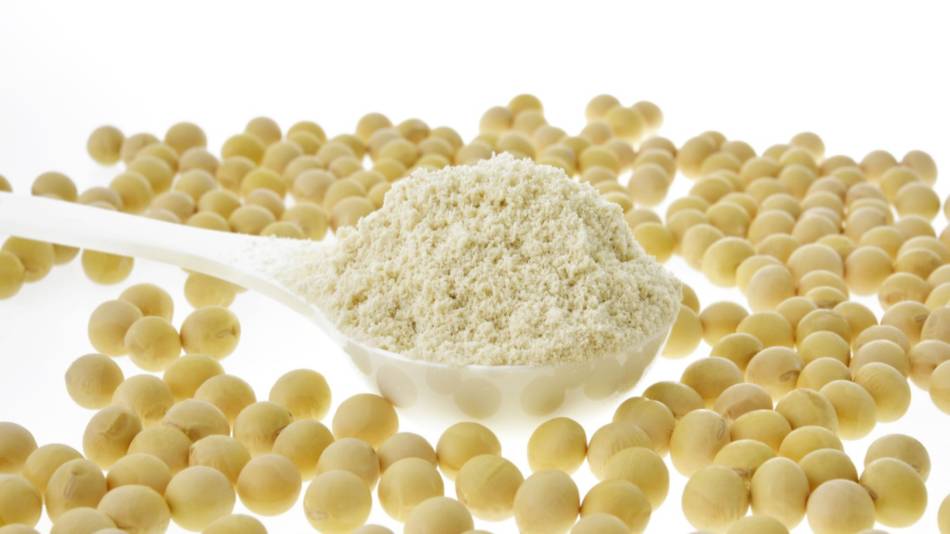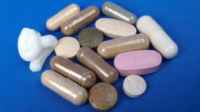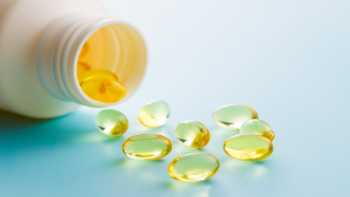
Answer:
Soy and compounds isolated from soy (including soy isoflavones and soy protein) may be included in supplements for health benefits, such as reducing menopausal symptoms, lowering cholesterol, or increasing bone density. Soy constituents (including soy lecithin or soy oil) may also be included in supplements as inactive ingredient/excipient or as a source of certain vitamins. For most people, soy and its constituents are considered safe. However, people with certain conditions — including soy allergy, certain types of breast cancer or a family history of breast cancer, prostate cancer, and those with thyroid conditions — may need to avoid certain soy constituents.
Read below for more details about the health benefits and/or safety concerns related to soy constituents (including soy protein, soy isoflavones, soy lecithin, and soybean oil), and how you can avoid soy in supplements if necessary.
Soy Isoflavones
Pros:
Soy isoflavones have weak estrogen-like activity. For this reason, soy isoflavones (typically about 50 to 120 mg) are often a key active ingredient in supplements intended to reduce menopausal symptoms, such as hot flashes. Soy isoflavones may also help maintain and increase bone density when taken in doses of about 100 mg daily. In women, high soy consumption early in life may help to lower the risk of breast cancer, as the soy isoflavones can compete against estrogen for estrogen receptors but are less active than estrogen itself.
Cons:
People with allergies or hypersensitivity to soy may have a similar reaction to products containing isolated soy isoflavones.
Due to the weak estrogen-like activity of soy isoflavones, there is concern that high doses of isoflavones may not be safe in post-menopausal women with estrogen receptor-positive breast cancer and may also slightly increase the risk of uterine cancer. For more information, see the Concerns and Cautions sections of the Menopause Supplements Review.
In men, higher soy intakes are generally associated with a lower risk of prostate cancer, but higher intakes of soy isoflavones are associated with an increased risk of advanced prostate cancer. For more details about this, see the Soy section of the Protein Powders and Shakes Review.
Soy isoflavone intake might affect thyroid function among people with impaired thyroid function, potentially increasing the dose of thyroid hormone required. People with impaired thyroid function should avoid soy isoflavone supplements. Although soy isoflavones may cause temporary increases in thyroid hormone levels among people with normal thyroid function, experts have concluded that supplements containing soy isoflavones, soy extract, or soy protein do not significantly affect thyroid hormone levels in these individuals (EFSA, EFSA J 2015).
Soy Protein
Pros:
When used along with regular resistance exercise, soy protein (which is considered a complete protein) can be just as effective as whey protein (which is made from cow's milk) for maintaining or building muscle mass. It contains little fat or cholesterol, especially if a soy "isolate" is used, and it is acceptable to vegetarians and vegans (unlike some other proteins).
Soy protein can contain soy isoflavones. Although it is not a concentrated source of these isoflavones (about 0.1 to 1 mg per gram, depending on the type of extraction, compared to about 2 mg per gram in soy flour), the amount can add up since a serving of protein can be fairly large. A 30-gram scoop of soy protein powder may, therefore, contain about 3 to 30 mg of soy isoflavones. Although this is lower than a standard dose of soy isoflavones, soy protein may modestly reduce menopausal symptoms, such as hot flashes. It has also been shown to help lower total and LDL cholesterol levels.
Cons:
Soy protein contains soy allergens, which may cause allergic reactions in some people. While soy allergies are rare, those allergic to soybeans should also avoid soy protein.
Due to soy isoflavones that can be present in soy protein, there is concern that it may have weak estrogen-like effects. For this reason, the same concerns noted about for soy isoflavones can apply to soy protein, particularly if one is having multiple servings per day, although clinical studies have shown no impact on estrogen levels or gynecomastia risk among men taking up to 150 mg of isoflavones daily. (Interestingly, whey protein can also contain these isoflavones, due to soy in cow feed, as well the hormone estradiol (an estrogen) that is naturally found in cow milk. However, as explained in our Protein Powders Review, amounts of estrogens or phytoestrogens in whey protein powders are very small and unlikely to be of any significance.)
Soy protein may affect thyroid hormone balance and inhibit the absorption of thyroid hormone medication. Anyone with thyroid disease or a predisposition to thyroid dysfunction should limit his or her intake of soy-based protein.
Soy Lecithin
Pros:
Soy lecithin is included in supplements as an emulsifier (to help mix fat-soluble and water-soluble ingredients) or a filler (to increase the bulk or volume of a product. Soy lecithin is about 2% to 3% choline, an important nutrient.
Cons:
Although soy lecithin does contain trace amounts of soy protein, the amount is too small to cause allergic reactions in most people who are allergic to soy. However, it may be prudent for people who are highly allergic to soy to avoid supplements containing soy lecithin (UNL Food Allergy Research and Resource Program, 8-7-2018; Food Allergy Canada, Soy 2022).
Soy lecithin does not contain a significant amount of isoflavones (Lee, Nutrients 2019). Consequently, soy lecithin would not be associated with isoflavone-related benefits and possible side effects.
Soybean Oil
Pros:
Soybean oil contains vitamin E in the gamma-tocopherol and alpha-tocopherol form. The oil provides 1.1 mg of active vitamin E per tablespoon. Soybean oil is also a good source of polyunsaturated fatty acids. It contains a moderate amount of vitamin K, with one tablespoon providing 25 mcg of vitamin K1 (phylloquinone) (ODS, Vitamin K Fact Sheet 3-29-21).
Cons:
There is some concern that soybean oil may cause allergies in people who are allergic to soy, but this is likely not a problem for most people. Soy allergens are found in soy protein, and most of the proteins are removed from soybean oil during the refining process. However, it may be prudent for people who are highly allergic to soy to avoid supplements containing soybean oil (Food Allergy Canada, Soy 2022).
Soybean oil does not contain a significant amount of isoflavones (OncoLink, 7-1-21). Consequently, soybean oil would not be associated with the benefits or potential side effects of soy isoflavones.
How can you avoid soy?
If you want or need to avoid soy, it's important to carefully check labels as soy and soy compounds can show up in surprising places. People often don't think that a simple mineral or vitamin supplement will contain other ingredients to which they are sensitive or allergic, but soy and soybean oil, for instance, can be found in some iron and calcium supplements, and even in supplements like fish oil and resveratrol. This is why we at ConsumerLab.com include the full list of ingredients for every product we review. At the end of the list of ingredients, many products also explicitly identify the common allergens they do not contain.
Before you buy a supplement, check our reports to find one that is Approved in our testing and does not contain potential allergens or other ingredients of concern to you.
Join today to unlock all member benefits including full access to all CL Answers and over 1,400 reviews.
Join NowAlready a member? Sign In Here.
Join now at www.consumerlab.com/join/










Submit your comment
This feature is restricted to active members.
Join now to add comments and get all member benefits, including over 1,400 reviews.
Join NowAlready a member? Sign in here.